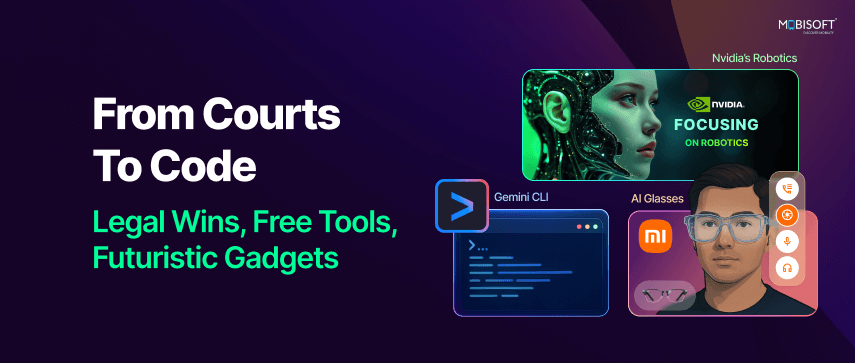
What does fair use mean for AI training and creativity?
A recent federal court ruling in favor of Anthropic opens new paths for AI tools in 2025 to learn from copyrighted materials, raising important questions about data and consent. At the same time, OpenAI, Xiaomi, and Google are launching advanced AI products that boost user and developer capabilities. Nvidia’s focus on robotics trends in artificial intelligence signals AI’s growing influence across industries.
This week, you’ll see how legal issues in generative AI are shaping the future of AI, discover wearable AI glasses challenging the status quo, and learn about AI command line tools making development faster and smarter. Last-mile delivery is evolving with safer trucking systems, while breakthroughs in genetics hint at a revolution in healthcare. Plus, get a front-row seat to innovations in e-commerce recommendation engines, developer tools, and communication. Stay ahead as these AI breakthroughs in 2025 redefine the way we live and work.
Judge Backs Anthropic’s AI Training on Books Without Author Consent
A federal judge ruled in favor of Anthropic, stating that using copyrighted books to train AI falls under fair use. This landmark legal decision sets a precedent for tech companies, though questions remain about how Anthropic copyright materials were sourced for its training library. The ruling may influence AI regulation and law in 2025.
OpenAI Brings Crossing Minds Team Onboard to Boost AI Recommendations
OpenAI has hired the team behind Crossing Minds, an AI startup known for its ecommerce recommendation engine. The move strengthens OpenAI’s post-training and agent capabilities, aligning with its broader push into practical, consumer-facing AI tools.
Driver Relay System Promises Faster Freight, Safer Roads, and Rested Drivers
The Driver Relay System divides long routes into shorter segments, letting multiple drivers rotate efficiently. This approach reduces fatigue, improves safety, and promises faster freight. With driver shortages and rising delivery demands, relay-based logistics offers a smarter solution for last mile delivery and transportation innovation.
Xiaomi Launches AI Glasses to Rival Meta’s Without Using Displays
Xiaomi has introduced AI-powered smart glasses featuring voice assistant integration, photo and video capture, and real-time translation. With no display, the smart glasses AI rely on voice and touch. Built for practicality, they challenge Meta’s models while catering to China’s growing wearable AI glasses market. This launch showcases how AI glasses work in 2025 and how wearables are shaping everyday interaction.
Nvidia Sees Robotics as Its Next Trillion-Dollar Market After AI
Nvidia CEO Jensen Huang highlighted the future of robotics in AI as the company’s next major growth area after AI. Despite making up just 1% of revenue now, Huang believes robotics trends in artificial intelligence, especially in self-driving cars and automation, will drive long-term demand for Nvidia’s chips and AI infrastructure.
Last-Mile Delivery Is Redefining Speed and Satisfaction in E-Commerce
Last-mile delivery now plays a critical role in shaping customer loyalty and business success. By ensuring fast, real-time tracked deliveries from warehouse to doorstep, businesses can meet rising consumer expectations and boost repeat purchases in an increasingly competitive market driven by AI tools and logistics technology.
Google Launches Gemini CLI to Bring AI Power Directly to Developers’ Terminals
Google has introduced Gemini CLI, an AI command line tool built for the terminal. It offers fast, local access to Google Gemini AI for coding, research, content generation, and task management. Integrated with Gemini Code Assist, it enhances AI-first development across VS Code and CLI environments. This launch marks a big step in the ChatGPT vs Gemini ecosystem.
Google’s AlphaGenome Aims to Decode DNA Impact with Powerful New AI
DeepMind has unveiled Google AlphaGenome, an AI model that predicts how DNA changes affect gene activity. Building on AlphaFold’s legacy, AlphaGenome could transform genetics research by helping scientists understand mutations and their role in health and disease more efficiently. This is one of the latest in artificial intelligence impacting healthcare directly.
Step-by-Step Guide to Building a React Admin Dashboard with Supabase
This tutorial walks you through creating a React admin dashboard integrated with Supabase for authentication, database, and storage. Combining Supabase’s backend tools with React Admin’s customizable interface delivers a powerful, efficient solution for modern web applications. This reflects the growing use of AI-powered dev tools and AI tools 2025 in app development.
What Else Is Happening?
- Alibaba’s AI Spots Stomach Cancer Instantly from CT Scans
- Doppl Helps You Try and Find Your Perfect Style
- Meet Gemma 3n: Mobile-First, Powerful AI Preview
- Build Apps Directly with Anthropic’s Claude Chatbot
- WhatsApp Adds Smart AI Summaries for Chats
What began as a legal dispute over training data now sets the tone for how AI will evolve. Anthropic’s copyright case raises new questions, even as OpenAI, Google, and Xiaomi roll out tools reshaping how we code, shop, and interact with devices. Google Gemini vs ChatGPT performance remains a hot topic. Logistics is being reengineered through relay-driven trucking and last mile delivery. In genetics and healthcare, AI is already influencing real outcomes. These are the signs that yesterday’s edge is becoming today’s foundation in the future of AI.
Subscribe to our latest tech news newsletter for regular insights that keep you informed and empowered and if you find value in it, please share with your network to help spread the word.
Catch you next time with fresh insights on AI and Tech, right here.
 July 1, 2025
July 1, 2025


